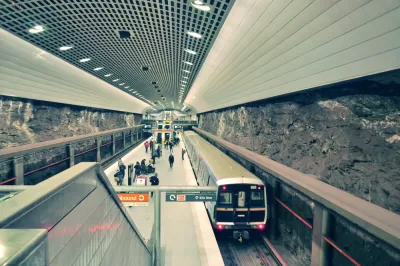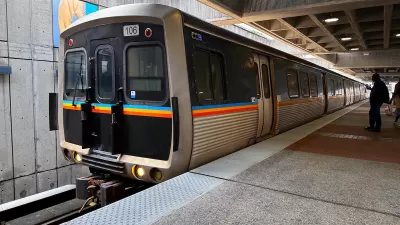The city has tasked the Metropolitan Atlanta Rapid Transit Authority with evaluating the feasibility of eliminating transit fares.

Atlanta could join the ranks of cities experimenting with fare-free transit, pending the results of a study commissioned by the city council in June, reports J.D. Capelouto in the Atlanta Journal-Constitution. “The study will only focus on the impact of fare-free MARTA within Atlanta city limits, but [Councilman Michael Julian Bond] hopes neighboring cities and counties that have MARTA service could eventually contribute to an expanded fare-free program.”
The ordinance passed by the city council requests information on:
- The cost of providing fare-free transit in the city
- The funding streams available to the city and MARTA
- A timeline for implementation
- A cost analysis of other cities in the United States that offer fare-free transit
- Partnerships that the city can establish to bolster the effort
This wouldn’t be MARTA’s first foray into free fares. “When the pandemic first hit, the agency waived bus fares, asking passengers to board from the back door to reduce contact with drivers. While it didn’t reach pre-COVID levels, bus ridership increased throughout that period, and sharply decreased when the fares were reinstated, MARTA data shows.”
“Still, the idea could face a number of hurdles, primarily surrounding how MARTA or the city would make up for a millions in lost fare revenue” and maintain or improve service frequency, which many riders say matters more than cost.
FULL STORY: MARTA hopes to answer: Could transit be free in Atlanta?

Planetizen Federal Action Tracker
A weekly monitor of how Trump’s orders and actions are impacting planners and planning in America.

Maui's Vacation Rental Debate Turns Ugly
Verbal attacks, misinformation campaigns and fistfights plague a high-stakes debate to convert thousands of vacation rentals into long-term housing.

Restaurant Patios Were a Pandemic Win — Why Were They so Hard to Keep?
Social distancing requirements and changes in travel patterns prompted cities to pilot new uses for street and sidewalk space. Then it got complicated.

In California Battle of Housing vs. Environment, Housing Just Won
A new state law significantly limits the power of CEQA, an environmental review law that served as a powerful tool for blocking new development.

Boulder Eliminates Parking Minimums Citywide
Officials estimate the cost of building a single underground parking space at up to $100,000.

Orange County, Florida Adopts Largest US “Sprawl Repair” Code
The ‘Orange Code’ seeks to rectify decades of sprawl-inducing, car-oriented development.
Urban Design for Planners 1: Software Tools
This six-course series explores essential urban design concepts using open source software and equips planners with the tools they need to participate fully in the urban design process.
Planning for Universal Design
Learn the tools for implementing Universal Design in planning regulations.
Heyer Gruel & Associates PA
JM Goldson LLC
Custer County Colorado
City of Camden Redevelopment Agency
City of Astoria
Transportation Research & Education Center (TREC) at Portland State University
Jefferson Parish Government
Camden Redevelopment Agency
City of Claremont





























